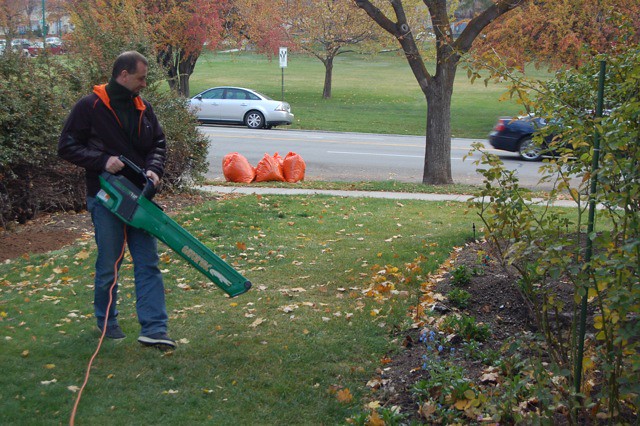Table of Contents Show
Using leaf blowers is a current customer that, in most cases, goes hand in hand with cleaning gardens and their surroundings. Its effective operation is essential and can achieve when the correct choice of blower makes.
For this, it is essential to take into account some characteristics, which you can learn about here, and thus purchase the best blower for you.

How Do You Determine a Good Leaf Blower?
Harvesting leaves in the fall is hard work when you don’t have the proper tools to make it easier. However, it is possible to eliminate pests and diseases on the lawn when the leaves are collected weekly, and a tool that helps to achieve this is the leaf blower.
Therefore, before making the purchase, it is essential to consider some characteristics that must review to be sure that you are choosing a suitable blower. These are the following:
Function
The first thing to review is the functions needed from the blower because there are many types of blowers and utility levels. So if you want one that is versatile with utility for multiple tasks, it is best to choose a blower that vacuums and shreds.
Power
The power of the leaf blower depends on the work capacity and durability of the engine. Therefore, it is essential to know the size of the land so that one with the appropriate power can choose without limitations.
The power recommended for an electric blower is between 2,500 and 3,000 watts and between 1 and 4 horsepower, gasoline blowers, and 2 to 4-stroke engines. However, some blowers work with electricity or battery, which means that they may have less power, but are less noisy and have a more straightforward system of use.
Read Also:
Blow Speed
The blowing speed is essential to deciding, with most being between 200 and 300 km/hour of airspeed expelled by the blower.
Suction Volume
This is a characteristic associated with the blowing speed, and it recommends that it not be less than 45 liters.
Weight
The blower’s weight depends on its type because those that work with gasoline are usually heavier than electric ones. However, the weight also depends on the design of the blower and the materials used to make it.
When the blower is lighter, it is easier to handle and transport and less force must be applied.
What Should I Look for When Buying a Leaf Blower?
Energy Supply
Battery blowers characterize by being comfortable, light, and autonomous. They help to clean large areas of land without having to use cables or extensions; They are also reticent and respectful of nature.
Electric blowers require minimal maintenance and are also lightweight and easy to transport. However, they lose a bit of mobility and comfort, have little power, and are not the best options for places with many trees and areas where connections or extensions are not possible.
Gasoline blowers are the least ecological, but they are a traditional option that continues to be the most used by consumers. They are versatile tools, more complete than the electric and battery models, operating with large displacement two and 4-stroke engines.
In addition, gasoline engines have more power and function for cleaning large sites.
The Ideal Power
The power of a blower is between 1,000 W to 4,500 W, but electric and battery models are generally limited to a capacity of 2,800 W. However, gasoline blowers can go up to 5,000 W, but it is an element that has to be related to each blower and cylinder system.
It is always best to choose the power that meets your needs, thus being genuinely functional in the long term.
The Capacity of Your Bag
This is essential in the suction function because there may be limitations between 20 and 50 liters. However, a wrong choice can cause significant problems, especially when choosing a small bag for cleaning large farms because it must be empty frequently.
It can also happen that a small bag in small gardens generates too much weight, which is uncomfortable for cleaning surfaces that are not extensive.
Adequate Weight and Portability
Using best leaf blower for pine needles for several hours at a time generates excellent physical wear, so weight and portability are related to each other with this tool. However, when they weigh a lot, they are more challenging to transport, and the possibility of handling is less, but they are estimates that vary in each model type.
Those with electric and battery systems weigh between 3 to 5 kg, so they are straightforward to transport and widely used for cleaning gardens and small farms. However, they have less power than gasoline blowers and are more functional for jobs requiring more excellent performance and mobility.
The weight of gasoline blowers can be a problem because they can exceed 10 kg, which makes transportation more complex and requires harnesses, handles, and adjustable straps. It is where comfort will always depend on the ergonomics of these accessories.
Adaptation to Benefits and Needs
The best leaf blowers distinguish by their performance, a plus of efficiency and functionality that demand consumers value. The electronic starter makes starting easier, reduces effort, and speeds up the work.
An anti-vibration design allows greater comfort, presenting vibrations in the medium or long term during the use time. All these elements eliminate hassle when grouping the leaves with the blowers.
How Many CFMs Should a Good Leaf Blower Have?
The best CFM for a leaf blower has to be in the 350 to 600 CFM range, blowing north of 190 MPH. If it is lower than this, you can be sure that the job will not be done correctly or will take longer.
What is Better CFM or MPH for a Leaf Blower?
Undoubtedly, the CFM is the best because it calculates the force of the air in a specific time, while the MPH calculates the amount of air generated within a particular time. However, there are blowers in which estimates of both data can obtain.
Conclusion
Leaf blowers are very functional tools for cleaning gardens or farms. Still, several types are available and, according to the energy and power supplies, making a clearer choice is advisable.
For more excellent operational safety in all contexts, without a doubt, the gasoline blower is the best. Still, electric or battery-powered blowers recommend for more straightforward tasks, characterized by being very practical when working.









